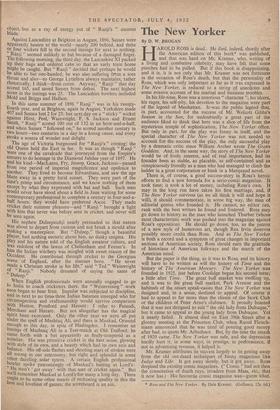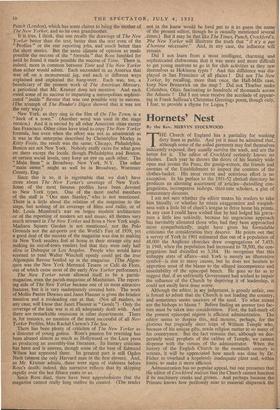The New Yorker
By D. W. BROGAN
HAROLD ROSS is dead. He died, indeed, shortly after the American edition of this book* was published, and that was hard on Mr. Kramer, who, writing of a living and combative celebrity, may have felt that some punches had to be pulled. But if this book is disappointing, and it is, it is not only that Mr. Kramer was not fortunate in the occasion of Ross's death, but that the personality of Ross, which was only important as far as it was expressed in The New Yorker, is reduced to a string of anecdotes and some evasive account of his marital and business troubles.
In his life-time, Ross was a notorious " character "; his ulcers, his rages, his self-pity, his devotion to the magazine, were part of the legend of Manhattan. It-was the public legend that, in part, accounted for the success of Mr. Wolcott Gibbs's Season in the Sun, for undoubtedly a great part of the audience liked to think that here was a slice of life from the mysterious temple of sophistication, The New Yorker office.
But only in part, for the play was funny in itself, and the special character of The New Yorker was not needed to account for the success of the play, the only successful play by a dramatic critic since William Archer wrote The Green Goddess. And, in the same way, the story of The New Yorker would be of lively interest, and of real importance, had its founder been as stable, as placable, as _self-contained and as conspicuously friendly as a man who had managed to climb the ladder in a great corporation or bank in a Marquand novel.
There is, of course, a good success-story in Ross's heroic efforts to find a new formula for a serio-comic magazine. It took time; it took a lot of money, including Ross's own. It may in the long run have taken his first marriage, and, if The New Yorker survives (as we all think it will and hope it will), it should commemorate, in some big way, the man of editorial genius who founded it. He cannot, no editor can, rank with the best writers he found and fostered. Ross may go down to history as the man who launched Thurber (whose most characteristic work was pushed into the magazine against Ross's opposition). He should go down, too, as the patron of a new style of humorous art, though Rea Irvin deserves possibly more credit than Ross. And as The New Yorker is both a record and a symptom of great changes in important sections of American society, Ross should earn the gratitude of historians of American folkways and the march of the American mind.
But the paper is the thing, as it was to Ross, and its history will have to be written as will the history of Time and the history of The American Mercury. The New Yorker was founded in 1925, just before Coolidge began his second term; a little after Time. The great bull market was swelling up, and it was to the great bull market, Park Avenue and the habitués of the smart speak-easies that The New Yorker was designed and, in a sense, destined to appeal. Of course it had to appeal to far more than the clients of, the Stork Club or the children of Peter Arno's clubmen: It proudly boasted that it was not designed to suit " the old lady from Dubuque," but it came to appeal to the young lady from Dubuque. Yet it nearly failed. It almost died on East 39th Street after a gloomy meeting at the Princeton Club, when Raoul Fleisch- mann announced that he was tired of pouring good money after bad, to quote Mr. Arbuthnot. But, by the time the smash of 1929 came, The New Yorker was safe, and the depression hardly hurt it; in some ways, in prestige, in performance, if not in advertising revenue, it helped it. Mr. Kramer attributes its success largely to its getting away from the old out-dated techniques of funny magazines like Judge and Life. It got away slowly, but it got away. Ross despised the existing comic magazines. (" Comic " had not then the connotation of death rays, invaders from Mars, etc., that it now has.) His favourite comic magazine was—guess what.
* Ross and The New Yorker. By Dale Kramer. (Gollancz, 12s. 6d.) Punch (London), which has some claims to being the 'mother of The New Yorker, and so its own grandmother.
It is true, I think, that one recalls the drawings of The New Yorker better than the text, better than the text even of the " Profiles " or the star reporting jobs, and much better than the short stories. But the same climate of opinion as made possible the success of the " formula " that Ross fumbled for until he found it made possible the success of Time. There is, indeed, more in common between Time and The New Yorker than either would admit. Each succeeded in an America that was off on a monumental jag, and each in different ways explained and exploited the hang-over. Each was, too, a beneficiary of the pioneer work of The American Mercury, a periodical that Mr. Kramer does not mention. And each owed some of its success to imparting a metropolitan sophisti- cated " inside " flavour that was one possible way to success. (The triumph of The Reader's Digest showed that it was not the only way.) New York, as they sing in the film of On The Town, is a " heck of a town." (Another word was used in the stage version.) And it is envied by all other American cities except San Francisco. Other cities have tried to copy The New Yorker formula, but even when the effort was not as amateurish as it was in the enterprise described by Christopher Morley in Kitty Foyle, the result was the same; Chicago, Philadelphia, Boston are not New York. Nobody really cares for what goes on there except the locals, though Philadelphia and Boston, at certain social levels, may keep an eye on each other. The " Main Stem" is Broadway, New York, N.Y. The other " main stems " might as well be in Broadway, Worcester County, Eng.
Since this is so, it is regrettable that we don't have more about The New Yorker's coverage of New York. Some of the most famous profiles have been devoted to New York types. One of the most useful members of the staff is " Our man Stanley," who is not mentioned. There is a little about the relation of the magazine to the stage, but nothing of its coverage of films and radio, or of Mr. Louis Mumford's war on bogus modern architecture or of the reporting of modern art and music, all themes very much stressed in The New Yorker and from a New York angle. Madison Square Garden is not mentioned, nor the Polo Grounds nor the air-ports nor the World's Fair of 1939, yet a good deal of the success of the magazine was due to making its New York readers feel at home in their strange city and making its out-of-town readers feel that they were only half alive in Dubuque or Los Angeles. People who would have scorned to read Walter Winchell openly could get the true Algonquin flavour bottled up in the magazine. (The Algon- quin was the New York Mermaid Tavern or Cafe de Flore, out of which came most of the early New Yorker performers.) The New Yorker never allowed itself to be a parish- magazine, even the parish-magazine pf Manhattan. The report- ing side of The New Yorker became one of its most attractive features, but it is very inadequately covered here. The work of Mollie Panter Downes and Janet Flanner is given the briefest mention and a misleading one at that. (Not all readers, in any case, will know that Janet Flanner is " Genet.") Only the coverage of the late war is at all adequately dealt with. And there are remarkable omissions in other departments. There is, for instance, no mention of the most successful of all New Yorker Profiles, Miss Rachel Carson's The Sea. There has been plenty of criticism of The New Yorker as a)distorter of young genius. Ross's passion for rewriting has been abused almost as much as Hollywood or the Luce press 'as producing an assembly-line literature. Its literary criticism has been and is uneven, though some of the best of Edmund Wilson has appeared there. Its greatest part is still Ogden Nash (almost the only Harvard man in the first eleven). And, as Mr. Kramer admits, there were signs of staleness before Ross's death; indeed, this narrative reflects that by skipping rapidly over the last fifteen years or so. ' Since Ross died, there have been apprehensions that the magazine cannot really long outlive its creator. (The reader not in the know would be hard put to it to guess the name of the present editor, though he is casually mentioned several Ames.) But it may be that like The Times, Punch, Crockford's, Phe New Yorker will illustrate the truth that "il n'y a pas d'hottune necessaire." And, in any case, the influence will remain.
Did I not learn from a most intelligent, charming and sophisticated clubwoman that it was more and more difficult to get young matrons to go in for club activities as they saw themselves as Hokinson types ? And this diffidence was dis- played in San Francisco of all places ! Did not The New Yorker, by recalling, more than once, the Hall-Mills case, keep New Brunswick on the map ? Did not Thurber make Columbus, Ohio, fascinating to hundreds of thousands across the Atlantic ? Did I not once receive the accolade of appear- ing in Frank Sullivan's Christmas Greetings poem, though only, I fear, to provide a rhyme for Logan ?



























































 Previous page
Previous page